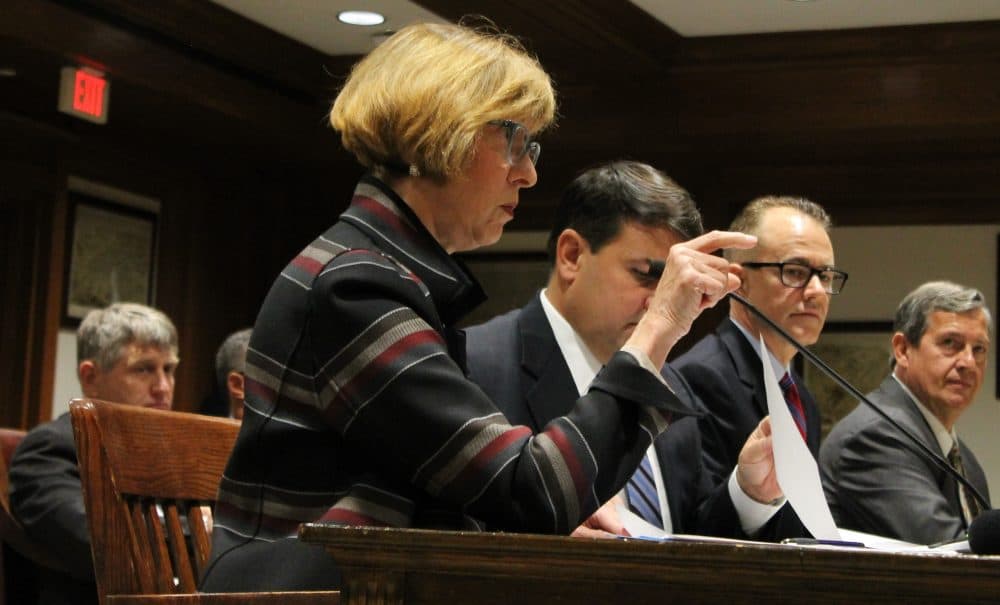Advertisement
State needs rural infrastructure rescue plan, should allocate federal funding, auditor says

As the Legislature zeroes in on plans to spend billions of dollars in federal COVID-19 relief funding, Auditor Suzanne Bump is calling for a "rural rescue plan" that would help the more than 100 mostly small communities in western Massachusetts pay to upgrade roads, bridges and municipal buildings.
Bump, who once resided in Great Barrington, said many cities and towns in Hampshire, Hampden, Franklin and Berkshire counties struggle to make critical infrastructure improvements, relying heavily on state aid as commercial tax bases have dried up and populations have declined, putting added pressure on property taxes.
"Now we have this golden opportunity that we'll never have again to invest in these communities," Bump said, previewing testimony she will give Tuesday at the Legislature's final hearing on how to spend nearly $5 billion in American Rescue Plan Act funds.
Ahead of her testimony, the auditor's office will release a new 105-page report focused on public infrastructure needs in western Massachusetts. The Easton Democrat is calling for more money to be funneled through the Chapter 90 road repair program, and for the funding formula to be revamped to provide greater support to communities with extensive road networks, but small populations and declining job bases.
Bump also wants to see a new state agency set up to support the construction of municipal buildings, similar to the Massachusetts School Building Authority, which has a revenue stream of one penny of the state's 6.25% sales tax to help finance $1 billion in school construction every year. She said there are places in western Massachusetts where firetrucks stay outside all year because they don't fit in the station, and she said the Pittsfield Police Department booking office is often used as a backdrop for movie directors "that want to depict a decrepit 1940s, 1950s police station."
"The tourism economy will only take the area so far, and not everybody can work at Berkshire Medical Center," Bump said. "We need this infrastructure to rebuild and attract private investments."
The auditor, who is not running for reelection in 2022, said her office has not identified a dedicated funding source for the new building authority, but suggested that revenue from the growing cannabis industry could be one place legislators look.
In addition to the influx of federal funds from the American Rescue Plan Act, lawmakers this fall are considering how to spend a fiscal year 2021 surplus and watching Congress where Democrats are struggling to pass a massive infrastructure package that would send even more money to Massachusetts.
Bump did not specify how much money she believes should be set aside for western Massachusetts infrastructure, but she said "commitments should be made now to make future resource allocations."
Advertisement
The auditor also said the funding situation in western Massachusetts could get worse as a result of redistricting if population growth near the coast results in fewer representatives in the Legislature advocating for the needs of the four western-most counties.
"The fact that our population and our economy is so heavily weighted in one area of the state means there are many more advocates for the cities and the suburbs to get their way on Beacon Hill. That's what makes this an opportunity that we just can't afford to miss for western Massachusetts," Bump said.
The report embraces the Massachusetts Municipal Association's longstanding request to increase annual Chapter 90 funding from $200 million to at least $300 million, and she said the formula that hasn't been adjusted since 1972 needs to be updated.
The current Chapter 90 formula allocates funding based on road mileage, population and employment levels. While communities in Suffolk County received an average of $12,169 per roadway mile in fiscal 2021, Franklin County towns received just $4,383 due to the weight the formula gives to population and levels of employment, according to the report.
Rep. Smitty Pignatelli, a Lenox Democrat, has filed a bill (H 3572) that would shift about 11% of the formula's weight toward road mileage and away from population and employment. Bump said it should be given "strong consideration."
The auditor's report also calls for more money to be put into popular, but underfunded programs like the Small Town Road Assistance (STRAP) and the Small Bridge and Culvert programs. Only $3.2 million in western Massachusetts projects were funded in fiscal year 2022 through STRAP from $20.6 million in grant applications.
Bump said STRAP grants are also of "limited value" when they are capped at $1 million and the average culvert replacements costs $850,000, calling for the cap to be lifted.
"They simply don't have the wherewithal to make these repairs," Bump said.
Finally, the report calls for continued investment in broadband infrastructure in western Massachusetts.
The report was produced by Bump's Division of Local Mandates, and DLM Director Ben Tafoya said the findings were based on surveys sent to all 101 communities in the four westernmost counties.
The division collected responses from 46 communities, including Springfield, which was analyzed separately due to its size. Additional interviews were conducted with regional planning officials and executive branch agency employees who administer grant programs.